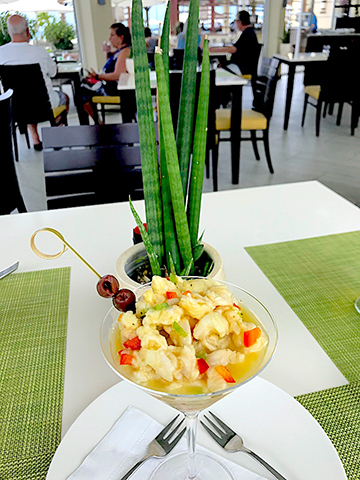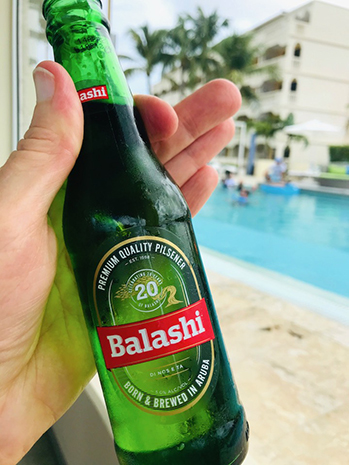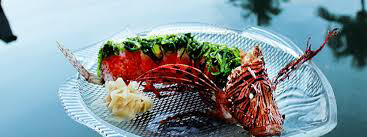| |

Lionfish ceviche is permanently on the menu at the Bucuti & Tara Beach Resorts in Aruba. Image by Tom Adkinson.
|
Evil invaders? That’s a fair description of a fish that belongs in the Indo-Pacific region, has no true predators on this side of the world, multiplies like rabbits and eats everything in sight. Oh, and its spines are venomous, too.
Unlike other invasive species (they got introduced through the aquarium industry), lionfish do have at least one positive attribute – they are tasty to that other species that eats everything in sight, humans.
“We have served lionfish on and off for 10 years and have listed it permanently on our menu for about two years,” said Marc Giesbers, executive chef at Bucuti & Tara Beach Resorts in Aruba.
“We use it for ceviche, although I’ve seen it served as nuggets and once as a whole fish that was deep-fried,” Giesbers said.

Beyond the Bucuti & Tara beach, the blue Caribbean harbors an unfortunately sizeable population of lionfish. Image by Tom Adkinson. |
Lionfish are not caught commercially anywhere. Instead, they are the quarry of spearfishermen who dive along reefs, natural and manmade, hunting for them.

Aruba’s only island-brewed beer, Balashi, goes nicely with lionfish ceviche. Image by Tom Adkinson.
|
|
“Some lionfish hunters see it as sport. Others are thinking about the environment and the destruction of the reefs and fish habitats caused by lionfish. Our guests love our lionfish ceviche, and I enjoy telling them about these spiky predators and how they damage Aruba’s ecosystem. Our credo is ‘Eat them to beat them,’” Giesbers said.
At Marathon in the Florida Keys, restaurateur and avid diver John Mirabella enjoys spearing lionfish for his own establishment, Castaway Waterfront Restaurant and Sushi Bar. He and some of his friends dive regularly for almost all of the restaurant’s seafood, and he has great fun with lionfish.
“Practically all of it is used for sushi in a special roll called the ‘King of the Jungle.’ It looks like a regular sushi roll, but I save the head and tail of the lionfish, deep-fry them and put them at either end of the roll. I like to say that you ‘get to meet your meal at the Castaway,’” Mirabella said.
Mirabella said he first observed lionfish in about 2008 and that the population quickly exploded. Lionfish live from the shoreline to about 1,000 feet deep and are most prolific at 200 to 400 feet down. Most weigh less than two pounds, and a three-pounder is a big fish, he noted.
That’s fairly small for an ocean fish, so some people wonder how lionfish are so detrimental.
The Lionfish.co website explains that invasive lionfish are potentially the fastest breeders in the western Atlantic basin (a female can release eggs approximately every four days, up to two million eggs a year) and that they will eat everything they can fit into their mouths. Scientists have catalogued more than 70 species of prey – dozens of fish species, plus shrimp, crabs, squid, lobsters and more.

Florida Keys restaurateur John Mirabella has fun with lionfish by creating the “King of the Jungle Sushi Roll.”
|
Studies have shown that a lionfish can reduce the number of small fish and other prey by 80 percent within five weeks of establishing its territory.
That can wreak havoc on an entire ecosystem, and that’s why people such as Craig Newton try to keep tabs on lionfish.
Newton, the invasive species coordinator and artificial reef biologist for the Alabama Marine Resources Division, reports that lionfish appeared in northern Gulf of Mexico waters in 2009 and quickly showed exponential growth.
Keeping lionfish in check is a challenge, but like Mirabella in the Florida Keys, sport fishing for lionfish in Alabama and the Florida Panhandle is having at least some effect, Newton said.
The Alabama Marine Resources Division, the Alabama Spearfishing Association and other organizations have sponsored lionfish tournaments, and Newton estimates that divers have removed several thousand pounds of lionfish in recent years.
Some have ended up on restaurant menus and even occasionally in the fish departments of supermarkets.
“The demand for lionfish is there, but there’s a supply challenge. There aren’t that many spearfishermen, and it’s expensive to hunt lionfish,” Newton said.
Still, it’s wise to be observant when on a coastal vacation. If a restaurant you visit offers lionfish, go for it – especially since someone else has dealt with the venomous spines.
Trip Planning Resources: Bucuti.com, CastawayFloridaKeys.com and Lionfish.co
(Travel writer Tom Adkinson’s new book, 100 Things To Do in Nashville Before You Die, is available at CornersOfTheCountry.com.)
Published May 22, 2020

